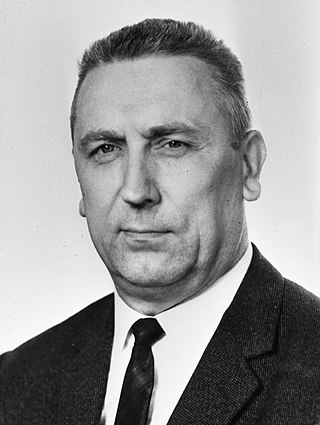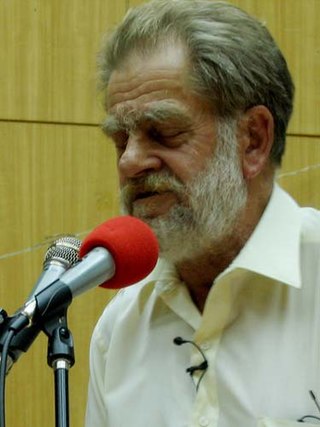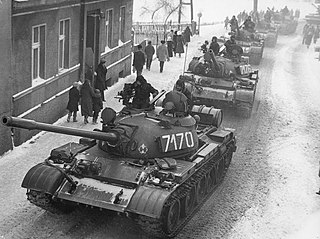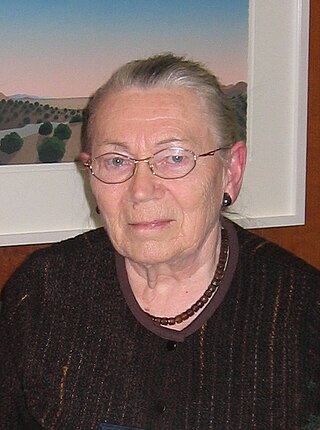| |||||
| Decades: | |||||
|---|---|---|---|---|---|
| See also: | |||||
| |||||
| Decades: | |||||
|---|---|---|---|---|---|
| See also: | |||||
Major strikes of December 1981 took place in the following enterprises:
- University of Łódź (December 13–15)
- Gdańsk Shipyard (December 13–16). Security forces tried to pacify it several times, finally managing to do so. 1,500 workers are fired after the protest.
- PZL-Świdnik (December 13–16). Pacified by the ZOMO in the night of December 15/16. The factory is militarized, 40 people are arrested.
- Wujek Coal Mine in Katowice (December 13–16), see Pacification of Wujek.
- Lenin Steelworks in Nowa Huta (December 13–17). Pacified by the ZOMO in the night of December 16/17.
- Szczecin Shipyard (December 13–18). On December 18, after pacification by the ZOMO, the shipyard was closed for 2 weeks, with 1000 workers dismissed.
- Gdańsk refinery (December 13–18), pacified by the ZOMO.
- Puławy Nitrogen Plant Azoty in Puławy (December 13–19), pacified by the ZOMO.
- Port of Gdańsk (December 13–20). Pacified both by the ZOMO and the Polish Navy units.
- Anna Coal Mine in Pszów (December 13–20), pacified by the ZOMO, with 102 miners remaining underground until December 20.
- Katowice Steelworks in Dąbrowa Górnicza (December 13–23), pacified by the ZOMO and Army units, with tanks and armored personnel carriers.
- Baildon Steelworks in Katowice, pacified by the ZOMO on December 14.
- Halemba Coal Mine in Ruda Śląska, pacified by the ZOMO on December 14.
- Bistona Textile Plant in Łódź, pacified by the Army on December 14.
- Anilana Polanil Textile Plant in Łódź, pacified on December 14.
- Teofilów Textile Plant in Łódź, pacified on December 14.
- Ursus Factory in Warsaw (December 14–15, pacified by the ZOMO, with 60 arrested.
- Manifest Lipcowy Coal Mine in Jastrzębie-Zdrój (December 14–15), pacified by the ZOMO with tanks, 5 miners are wounded.
- Staszic Coal Mine in Katowice (December 14–15), pacified by the ZOMO.
- Stocznia Gdynia (December 14–15), pacified by the ZOMO and Army units.
- Andaluzja Coal Mine in Piekary Śląskie (December 14–17). The strike ended after miners get the news of the massacre at Wujek Coal Mine.
- FSC Lublin (December 14–17), pacified by the ZOMO.
- Pafawag and Dolmel Factories in Wrocław (December 14–19). Both factories, which are situated next to each other, joined forces, under leadership of Władysław Frasyniuk. On December 18 Dolmel is militarized, and the strike ends next day.
- Rolling Bearings Factory in Kraśnik (December 14–18), pacified by the ZOMO.
- Agriculture Machinery Plant Agromed-Archimedes in Wrocław (December 14–19). The strike is pacified by the army and the ZOMO.
- Mera-Elwro in Wrocław (December 14–21). Pacified by the army and the ZOMO.
- Bumar-Fadroma in Wrocław (December 15–18). ZOMO units pacify the enterprise on December 16, but since employees are not willing to work, the factory is shut down on December 18.
- Ziemowit Coal Mine in Tychy (December 15–23). Some 1,400 miners remain underground for several days.
- Piast Coal Mine in Bieruń. See 1981 strike at Piast Coal Mine in Bieruń.

Solidarity, full name Independent Self-Governing Trade Union "Solidarity", is a Polish trade union founded in August 1980 at the Lenin Shipyard in Gdańsk, Poland. Subsequently, it was the first independent trade union in a Warsaw Pact country to be recognised by the state.

The Polish United Workers' Party, commonly abbreviated to PZPR, was the communist party which ruled the Polish People's Republic as a one-party state from 1948 to 1989. The PZPR had led two other legally permitted subordinate minor parties together as the Front of National Unity and later Patriotic Movement for National Rebirth. Ideologically, it was based on the theories of Marxism-Leninism, with a strong emphasis on left-wing nationalism. The Polish United Workers' Party had total control over public institutions in the country as well as the Polish People's Army, the UB and SB security agencies, the Citizens' Militia (MO) police force and the media.

Wojciech Witold Jaruzelski was a Polish military general, politician and de facto leader of the Polish People's Republic from 1981 until 1989. He was the First Secretary of the Polish United Workers' Party between 1981 and 1989, making him the last leader of the Polish People's Republic. Jaruzelski served as Prime Minister from 1981 to 1985, the Chairman of the Council of State from 1985 to 1989 and briefly as President of Poland from 1989 to 1990, when the office of President was restored after 37 years. He was also the last commander-in-chief of the Polish People's Army, which in 1990 became the Polish Armed Forces.

Edward Gierek was a Polish communist politician who served as the de facto leader of the Polish People's Republic between 1970 and 1980. Gierek replaced Władysław Gomułka as the First Secretary of the ruling Polish United Workers' Party (PZPR).

Andrzej Gwiazda is an engineer and prominent opposition leader, who participated in Polish March 1968 Events and December 1970 Events; one of the founders of Free Trade Unions, Member of the Presiding Committee of the Strike at Lenin Shipyard in Gdańsk in August 1980, Vice President of the Founding Committee of Solidarity, then Vice President of Solidarity in 1980 and 1981; in December 1981 interned and next imprisoned with six other Solidarność leaders. His wife, Joanna Duda-Gwiazda also was a prominent member of the anticommunist opposition in the 1970s and 1980s.

The Polish Round Table Talks took place in Warsaw, Poland from 6 February to 5 April 1989. The government initiated talks with the banned trade union Solidarność and other opposition groups in an attempt to defuse growing social unrest.

Stanisław Kania was a Polish communist politician who served as the de facto leader of the Polish People's Republic as First Secretary of the ruling Polish United Workers' Party (PZPR) between September 1980 and October 1981.

Presidential elections were held in Poland on 25 November 1990, with a second round on 9 December. They were the first direct presidential elections in the history of Poland, and the first free presidential elections since the May Coup of 1926. Before World War II, presidents were elected by the Sejm. From 1952 to 1989—the bulk of the Communist era—the presidency did not exist as a separate institution, and most of its functions were fulfilled by the State Council of Poland, whose chairman was considered the equivalent of a president.
The history of Poland from 1945 to 1989 spans the period of Marxist–Leninist regime in Poland after the end of World War II. These years, while featuring general industrialization, urbanization and many improvements in the standard of living,[a1] were marred by early Stalinist repressions, social unrest, political strife and severe economic difficulties. Near the end of World War II, the advancing Soviet Red Army, along with the Polish Armed Forces in the East, pushed out the Nazi German forces from occupied Poland. In February 1945, the Yalta Conference sanctioned the formation of a provisional government of Poland from a compromise coalition, until postwar elections. Joseph Stalin, the leader of the Soviet Union, manipulated the implementation of that ruling. A practically communist-controlled Provisional Government of National Unity was formed in Warsaw by ignoring the Polish government-in-exile based in London since 1940.

Martial law in Poland existed between 13 December 1981 and 22 July 1983. The government of the Polish People's Republic drastically restricted everyday life by introducing martial law and a military junta in an attempt to counter political opposition, in particular the Solidarity movement.
Communism in Poland can trace its origins to the late 19th century: the Marxist First Proletariat party was founded in 1882. Rosa Luxemburg (1871–1919) of the Social Democracy of the Kingdom of Poland and Lithuania party and the publicist Stanisław Brzozowski (1878–1911) were important early Polish Marxists.

Anna Walentynowicz was a Polish free trade union activist and co-founder of Solidarity, the first non-communist trade union in the Eastern Bloc. Her firing from her job at the Lenin Shipyard in Gdańsk in August 1980 was the event that ignited the strike at the shipyard, set off a wave of strikes across Poland, and quickly paralyzed the Baltic coast. The Interfactory Strike Committee (MKS) based in the Gdańsk shipyard eventually transformed itself into Solidarity; by September, more than one million workers were on strike in support of the 21 demands of MKS, making it the largest strike ever.

Independent Students' Association is a Polish student society, created in October 1980, in the aftermath of the Gdańsk Agreement and the anti-government strike actions. It was a student arm, or suborganization, of Solidarity, and together with it, as well as other similar organizations, was banned after the implementation of martial law in Poland. Some activists were arrested, and others organized an underground NZS. After the fall of Communism in 1989, the organization was recreated, and its focus was changed from political to cultural, although it still stands by its origins, as seen by Polish students’ support for the Orange Revolution in Ukraine. It now is the largest independent student organization in Poland, with 90 chapters at Polish universities and a total of 20,000 members.

Solidarity, a Polish non-governmental trade union, was founded on August 14, 1980, at the Lenin Shipyards by Lech Wałęsa and others. In the early 1980s, it became the first independent labor union in a Soviet-bloc country. Solidarity gave rise to a broad, non-violent, anti-Communist social movement that, at its height, claimed some 9.4 million members. It is considered to have contributed greatly to the Fall of Communism.
In the early spring of 1981 in Poland, during the Bydgoszcz events, several members of the Solidarity movement, including Jan Rulewski, Mariusz Łabentowicz and Roman Bartoszcze, were brutally beaten by the security services, such as Milicja Obywatelska and ZOMO. The Bydgoszcz events soon became widely known across Poland, and on 24 March 1981 Solidarity decided to go on a nationwide strike in protest against the violence. The strike was planned for Tuesday, 31 March 1981. On 25 March, Lech Wałęsa met Deputy Prime Minister Mieczysław Rakowski of the Polish United Workers' Party, but their talks were fruitless. Two days later, a four-hour national warning strike took place. It was the biggest strike in the history of not only Poland but of the Warsaw Pact itself. According to several sources, between 12 million and 14 million Poles took part.

Rural Solidarity is a trade union of Polish farmers, established in late 1980 as part of the growing Solidarity movement. Its legalization became possible on February 19, 1981, when officials of the government of the People's Republic of Poland signed the so-called Rzeszów - Ustrzyki Dolne Agreement with striking farmers. Previously, Communist government had refused farmers’ right to self-organize, which caused widespread strikes, with the biggest wave taking place in January 1981. The Rural Solidarity was officially recognized on May 12, 1981, and, strongly backed by the Catholic Church of Poland, it claimed to represent at least half of Poland's 3.2 million smallholders.

The 1988 Polish strikes were a massive wave of workers' strikes which broke out from 21 April 1988 in the Polish People's Republic.

The 1982 demonstrations in Poland refers to anti-government street demonstrations organized by underground Solidarity to commemorate the second anniversary of the Gdańsk Agreement. The bloodiest protest occurred in southwestern Poland, in the town of Lubin, on August 31, 1982. The Lubin demonstration resulted in three protesters killed by Communist services, and an unknown number of wounded. On the same day, rallies and demonstrations took place in several cities across the country. According to Solidarity sources, there were four more victims—in Wrocław, Gdańsk, Nowa Huta, and Toruń. According to official government sources, there were demonstrations in 66 cities.

Lech Wałęsa is a Polish statesman, dissident, and Nobel Peace Prize laureate, who served as the president of Poland between 1990 and 1995. After winning the 1990 election, Wałęsa became the first democratically elected president of Poland since 1926 and the first-ever Polish president elected by popular vote. A shipyard electrician by trade, Wałęsa became the leader of the Solidarity movement and led a successful pro-democratic effort, which in 1989 ended Communist rule in Poland and ushered in the end of the Cold War.